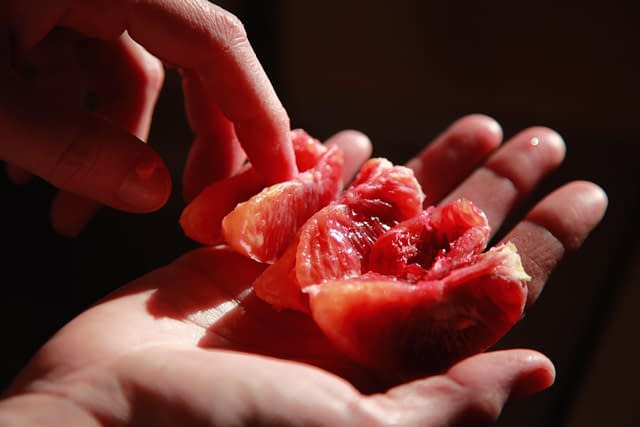
After twenty years of consecutive monogamous relationships, I decide to spend three months completely celibate. Technically, I decided this a year ago, but then promptly got into five brief entanglements. Each had a frantic tinge, like the last handful of popcorn you cram into your mouth after you’ve promised yourself to stop eating it.
Though I’m fairly certain I’m not a “sex and love addict,”1 I attend a few recovery meetings to confirm it. Changing a fundamental part of one’s lifestyle or outlook tends to pull back the veil on unexamined beliefs, and deliberating over what to wear to my first meeting reveals my bias against femme fashion, as opposed to athleisure. I don’t want to dress the part; my usual attire — form-fitting head-to-toe black and heels — seems to evoke sex and love addict.2 I decide on the only pair of loose-fitting pants I own, a hoodie, and sneakers.
I’ve often envied women who wear sneakers every day; perhaps I’ll be wearing them, too, by the end of my celibate period. The prospect both excites and scares me. How much of what I consider my personality — clothes look better on me with heels — are symptoms of my orientation to the perceptions of others in general and potential lovers in particular?
On my way to the meeting, I get a text from a recent date. I didn’t have a great time with her, but still agreed when she suggested we see each other again — partly because I find disagreeing disagreeable, especially when it can be postponed, and partly because I wasn’t ready to eliminate the option yet. Hoarding romantic possibilities is an old and reliable source of comfort.
I consider texting her back to explain I’m not interested. I consider telling her that I’ll be available in three months. Instead, I put my phone in my pocket.
Though I expected the recovery meeting to be full of straight women who look like wrung-out dish towels, I’m surprised to find the cozy, wood-floored room in the back of the church populated by vivacious women. Plenty of them are dressed all in black and wearing heels. They don’t appear to have sold their souls to the god of heterosexual fetishism.3 A few even emit a queer signal, though all are femme presenting. I sit in a folding metal chair with my Styrofoam cup of coffee, embarrassed by my presumptuousness.
The meeting’s speaker talks about never being single, getting off on being wanted by people she wasn’t even attracted to, having boyfriends she was ashamed to be seen with in public, compulsively masturbating. She also refers to something called a “rain check,” which, as far as I can tell, is when you keep a sexual or romantic option open, just in case, despite it being unappealing or inappropriate. I always kept the back burner warm, she tells us.
When she started recovery, she spent a year totally free of dating, sex, flirting, and masturbation. This sounds extreme to me, although before I got clean from heroin, total abstinence from all mind-altering chemical substances also seemed extreme to me.
But then, sex and love lie in a less binary realm of addictions — along with food, work, and codependency — whose objects can’t necessarily be removed wholesale from one’s life. I gather from the women who share their stories next that every sex and love addict determines their own definition of abstinence, based on their own particular set of troubling behaviors, though many relinquished masturbation.
Once I get over my delight at being in a room of women willing to refer casually to their self-pleasure practices, my resistance is immediate. I hadn’t even considered refraining from masturbation. I don’t think it’s ever been a compulsive behavior for me, except perhaps during puberty, and I’m not interested in pathologizing healthy behaviors. I’ve decided to be celibate in an effort to simplify my life, not complicate it.
On the other hand, I’m also here because I don’t entirely trust my own perceptions. Compulsive behaviors are resilient and can bend perception to protect themselves. A compulsion that causes anxiety and also treats it can function like a psychological autoimmune disorder.
My first orgasm was to the movie Valley Girl, starring Nicolas Cage. I sat on the floor, experimenting with my body, while my grandmother lay asleep behind me on the sofa.
But my first lover was the bathtub faucet.4 How did I even think to position myself under it, feet flat against the wall on either side of the hot and cold knobs? It wasn’t a natural position, but it was a natural inclination.
After that, I experimented with all sorts of household objects and reading materials from Valley of the Dolls to Rubyfruit Jungle.
How comforting it was to learn, years later, of the “hydrotherapy” craze that took hold of European and North American bath houses in the late eighteenth century. From Bath, England, to Saratoga Springs, New York, doctors touted the water cure for the disease of hysteria, which had literally been plaguing women for centuries, according to men.
The word hysteria is derived from the Greek word for uterus, which Plato famously described as “the animal within the animal.”5 It was believed that the uterus would set out wandering around the body if it was deprived of a baby, repelled and drawn by powerful smells, like a raccoon poking around a row of garbage cans. Everyone from ancient Greeks to doctors who specialized in gynecology hundreds of years later postulated that a bad case of Wandering Womb led to hysteria, that better-known affliction.
Symptoms might include headaches; fatigue; any sort of melancholy, frustration, or anxiety; an excess or deficit of sexual interest with “an approved male partner” — basically, the expression of any response other than total contentment to the patriarchal structures that governed their lives or a failure to reinforce the androcentric model of sex that reigned (and still does). Doctors of the nineteenth century claimed that more than 70 percent of women suffered from hysteria, thereby making it the pandemic of their time.
Hydrotherapy most popularly featured a high-pressure shower or “douche” that massaged the pelvic region — sometimes in the exact way I discovered my bath faucet could at eleven. According to an 1851 essay by R. J. Lane about an English spa, after treatment the patients often claimed to feel “as much elation and buoyancy of spirits, as if they had been drinking champagne.” Common prescriptions suggested application of the water douche for four to five minutes, the same length of time in which most people are able to achieve orgasm via manual masturbation.
Despite my lack of neurosis around masturbation, I didn’t get my first vibrator until my senior year of college, when a friend gifted me a pink Pocket Rocket. A bestseller for some forty years, it’s the Toyota of vibrators: unglamorous, reliable, longitudinal. I used it for a decade, until its buzz grew so loud that it sounded like an actual Toyota in need of a new muffler and finally sputtered out for good.
In my early twenties, my best friend and I lived in a series of Brooklyn apartments and shared a gargantuan vibrator that we christened “the Hammer of the Gods.” It was roughly the size and shape of a human arm, hinged at the “elbow,” with a blunt end where its hand would be. Whenever we felt so moved, we would simply shuffle into the other’s room, unplug it, and carry it to our own bedroom. We joked that we practically had to wear jeans when using it because the even the lowest setting would otherwise render our genitals insensate.
The Hammer wasn’t what either of us would’ve chosen (most likely a Hitachi Magic Wand, that more elegant, powerhouse vibrator), but it had been a gift to my roommate from a client at the dungeon where we both worked as pro-dommes. That’s also where we met, and where I learned how to talk freely about my own pleasure. When desire (or anything, really) becomes a perfunctory part of one’s job, it’s stripped of whatever aura it carried before. There’s no room for the sacred or profane in shoptalk.
The client who gifted it to us would come in every week for a session with his current favorite, moving on every month or so to a newer hire. His requests were predictable: he basically just wanted to watch you get off with a giant vibrator, or to get you off with it. It seemed like a good deal, getting paid seventy-five dollars an hour to be brought to orgasm, or to masturbate for a one-man audience whose opinion meant next to nothing.
But I saw him only once. I found it unbearable to be watched and couldn’t stand to let a strange man do what I so enjoyed doing myself.
It makes sense that men in the nineteenth century wanted the hysteria “solution” to be administrable only by them. They got to have it all: to propagate a model of ideal sex that served them alone in terms of pleasure and procreation, to medicalize women’s pleasure, and to encourage women’s dependence on them. This way, they could deprive women of the legitimate satisfactions of both social freedom and sexual pleasure, pathologize their natural response, and then charge them money for a modicum of temporary relief. What a coup, for men to convince us that being brought to orgasm only by them was a “cure” for the imaginary illness whose symptoms were our humanity; to tell us that to masturbate ourselves (along with drinking coffee or alcohol, and a slew of other ordinary behaviors) was a cause of the illness.6
There’s a five-minute break halfway through the recovery meeting. I smile at the other women as I refill my tiny cup with watery coffee. I pull out my phone and look at the text from my former date. I put my phone away again.
I can see how breaking the habit of issuing rain checks might be useful. However, the idea of banning masturbation when it hasn’t caused a problem stinks a little bit of what Foucault called “the hysterization of women’s bodies,” which is to say the dangerous and deeply misogynistic practice of pathologizing women’s sexuality such that it requires the medical interventions of men.
On the other hand, there are no men here.
Locked inside the bathroom, hazy with steam and the ssshhhhhhh of rushing water, I felt most alone. In the trance of orgasm, I forgot myself completely. I forgot the bath, the room, the house, the town — every context in which I understood myself. Without a self, a body is everywhere and nowhere at once. Pleasure becomes synesthetic — exploding like splattered paint across the sky of consciousness. It’s a big bang of deafening thunder, the smell of lavender and salt.
“In this vision my soul, as God would have it, rises up high into the vault of heaven and into the changing sky and spreads itself out,” wrote Hildegard von Bingen, the Benedictine abbess and mystic saint who’s intrigued me since I was a child. In her seventies, she described her lifelong visions in a letter: “The light which I see … is far, far brighter than a cloud which carries the sun. I can measure neither height, nor length, nor breadth in it; and I call it ‘the reflection of the living Light.’ And as the sun, the moon, and the stars appear in water, so writings, sermons, virtues, and certain human actions take form for me and gleam.”
The aloneness of orgasm, the unbeingness of it, is similar in many ways to that of creation. When I am in the trance of creative concentration my self and its external contexts disappear, though sensation persists. The body becomes a mirror that reflects something other than self, something that disperses the self to make room for a different kind of story.
I try to imagine, instead of pursuing my own ecstasy under the rush of water, standing in a bathhouse while doctors hose me down with a massive, deafening contraption.
As an adult, I’ve not often been a light-candles-around-the-bathtub type of masturbator. I’m more of an eat-a-bag-of-chips kind of masturbator. A procrasturbator. The time that I most reliably masturbate is when I’m in the early stages of writing something new. Maybe it’s a way to burn off the nervous energy of breaking ground on a thing, but that seems generous.
The definition of compulsion is an act meant to relieve a mental obsession, or some kind of distress. In that sense, my masturbatory practices qualify as compulsive. I’m compelled by the anxiety of writing to watch a round of porn and have a handful of orgasms.
But then, when lovers asked me to touch myself so they could watch, I always refused. I was shy, but that wasn’t it. There was no performance to my self-pleasure and there was so much performance with lovers. Masturbation felt private in a way that made exposure intolerable.
It also seemed like the only kind of sex that had nothing to do with pleasing anyone else or performing my desire or sexuality for someone else’s benefit. As a young person, it felt in direct opposition to my partnered experiences. Though I’ve had plenty of orgasms with other people in my twenties and thirties, there was always an element of performance, of body consciousness, of other orientation. But the pleasure of a solitary orgasm has often felt like sunlight or thunder — elemental.
I’d had no internalized male gaze that directed my masturbation, and not because self-pleasure is exempt from it; it forms the basis of a whole genre of porn, with copious subgenres. My masturbatory fantasies abound with all sorts of hyperpatriarchal shit, but those images don’t dominate my consciousness or govern what I do with my body. I suspect that this exemption is due to the fact that my practice of self-pleasure predates that of performance. It’s a relationship I formed with myself before I ever formed a sexual relationship with another person.
And so, my need for celibacy has more to do with performance than it does with pleasure. It’s not physical lust that’s compelled me from monogamous relationship to monogamous relationship. If my ceaseless entanglements are a result of the ways that I relate to other people, then the goal of my celibacy is to relate to myself.
When Hildegard von Bingen took a vow of celibacy, her ostensible goal was to relate more closely to God. But God didn’t assume human form; the only human forms in her abbey were other women, and she worked her whole life to make it so. At their inductions, she dressed them as brides in extravagant white silk, their hair flowing long and wild. She even had passionate relationships with some — though according to her, she never had sex with anyone.
How then, did she write the first description of a female orgasm? How did she know the “sense of heat in her brain”? How “the woman’s sexual organs contract, and all the parts that are ready to open up during the time of menstruation now close, in the same way as a strong man can hold something enclosed in his fist”?
Beguine Mechthild of Magdeburg writes of eating and drinking Christ in sensuous rapture, while Beguine Agnes Blannbekin tells a bizarre story of conjuring the foreskin of Christ on her tongue and swallowing it, an act that wracks her whole body with orgasmic pleasure, one she repeats a hundred times. Catherine of Siena used Christ’s foreskin as a ring when she wed him. Teresa of Ávila writes of an angel who “plunged [his] dart several times into my heart and that it reached deep within me. When he drew it out, I thought he was carrying off with him the deepest part of me; and he left me all on fire with great love of God. The pain was so great that it made me moan, and the sweetness this greatest pain caused me was so superabundant that there is no desire capable of taking it away.”
Some of these descriptions read like straightforward erotica, sometimes quite kinky and seemingly stripped of coy metaphors. Others, like the accounts of Hildegard, seem more to convey oneness with the world, a spiritual experience achieved through the body (as so many are).
It’s also a recurrent theme in hip-hop.As Tyler the Creator raps in Pusha T’s “Trouble on My Mind,” I’m a problem / ’Cause I wanna fuck the world but not a fan of using condoms. Like many rappers, his is less an erotic wish than one of domination. He wants to overpower the world, maybe even impregnate it, as fucking and impregnating a woman would be evidence of his masculinity and dominance.7
Conversely, the female mystics want to yield to the divine, to disperse their selfhood into the universe. Though I want to be careful not to reinforce a false binary: men want to dominate while women want to yield. We are powerfully conditioned in these relationships to sex — socially, legally, and in all the more insidious ways. However it assigns power, it is a dichotomy that harms everyone. I imagine what it must feel like to have your sex, your very genitals, equated with dominance and violence, an insult8 equated with defilement, and it must be confusing, degrading in a different but not incomparable way to having euphemisms for my genitals used as an insult equated with weakness.9
I suspect that everyone has desires to yield and to dominate. Sometimes, even the mystic saints’ descriptions of yielding sound nothing like submission. When the divine is writing through you, your voice might sound more like that of a god than a supplicant. Most of us find imaginative means of articulating even our most stigmatized desires. Sometimes wanting to fuck the world must be expressed in more poetic terms.
“I am the flame above the beauty in the fields,” wrote Hildegard. “I shine in the waters; I burn in the sun, the moon, and the stars. And with the airy wind, I quicken all things vitally by an unseen, all-sustaining life.”
At the summer camp I attended as an adolescent, we played a game called Fishbowl, during which all the girls would sit in a circle while the boys sat silently outside of it (in a following round, we would reverse positions). A female counselor would ask questions that the boys had submitted anonymously ahead of time. One of the questions the boys always asked was, What does a female orgasm feel like?
Convulsion, we said.
A bright light flashing. A ripe persimmon, squeezed in a fist.
Hildegard called her work “the living light.” She told others of her visions starting in her early childhood, but no one particularly cared until she was forty. As soon as her direct line to God was recognized by men, she claimed that God had commanded her: “Make known the wonders you live, put them in writing, and speak.”
In the High Middle Ages, women weren’t allowed to write music in the Church, and certainly no one was interested in their ideas or stories — but Hildegard became one of the most powerful and prolific thinkers in history. She wrote copious religious and scientific texts, was an unparalleled composer and lyricist, and even invented a secret language for her nuns to speak to one another.
Her understanding of physical pleasure seems not to have hindered this, though I think entanglement with another person certainly would have.
I decide that I can masturbate in my period of celibacy. This abstinence is all about other people, not the expulsion or containment of desire. Solitude, I believe, can be very sexy. In solitude, like masturbation, the body opens — but if not to another, then to what?
When I get home from the meeting, I look at the text from my date once more. Then I delete it and block her number.
Afterward, there’s an empty feeling that reminds me of turning off the television as a kid. As if all the light has momentarily been sucked out of the room. There’s a flutter of terror — What now?
But I can hear the hum of the refrigerator, a car hissing by outside. My own breath rises and falls.
Perhaps the mystic nuns just wanted to live freely among other women, to compose music and write and wear luxurious silks and let their hair flow freely. Proving an exceptional relationship to God was the single route to such freedoms. Yielding to the divine was the only way to avoid yielding to men. I don’t think desire to be free precludes a relationship to the divine, or that either precludes erotic pleasure. The body is an instrument for all of these, but in every case, its retrieval from the possession of others is a first step. Alone in my bedroom, I touch myself and think of the universe. As pleasure disperses my consciousness, I can feel the world getting bigger.
ENDNOTES
1. As distinct from a “sex addict.” There are different recovery communities for each.
2. I suspect there are actually more sex addicts clad in athleisure than in all-black and heels, as these styles generally fall along gendered lines, so my bias is probably just a symptom of your run-of-the-mill internalized sexism. (While there are studies that show men are more likely to develop sex addiction, it’s also true that men have overwhelmingly made up the subjects of sex addiction studies.)
3. Apparently, I think of sex and love addiction as kind of a straight thing (thereby rendering it extra distasteful), which I know isn’t true.
4. During the writing of this essay, I was continually frustrated by the deficit of synonyms for “masturbation,” which is such an ungainly word and occurred so very many times, but all the alternatives were either phallocentric or gross, and most were both. Some alternative options that I solicited from friends: she-bop, winnowing, polishing the pearl, fracking, rubbing one out (I suspect originally intended for those with penises but clearly applies more aptly to clitoral masturbation), flicking the bean, clicking the mouse, handy tooling, jilling off, spackling, and diddling the skittle. I personally came up with “the Circle Game,” although it may be too specific to my own masturbatory motions. Eve Kosofsky Sedgwick’s “isometric exercise” is also a favorite.
5. Centuries later, Sigmund Freud developed the theory of the unconscious mind — the mind within the mind — which he similarly characterized as a sort of wild animal. He also wrote, with the physician Josef Breuer, an entire book about hysteria, Studies in Hysteria (published in 1895).
6. How appropriate that George Taylor, who patented his steam-powered table vibrator in the late nineteenth century, called the cumbersome and expensive apparatus the “Manipulator.”
7. Similarly, go fuck yourself is one of the more satisfying insults, though it doesn’t make a lot of sense to me. Who doesn’t want to go fuck themselves? Some of the best fucking of my life has been with myself.
8. “Eat a dick,” “suck my dick,” “fuck you,” and on and on, ad infinitum.
9. How disturbing and sad it is that our genitals are so often the basis of our most poisonous insults.


